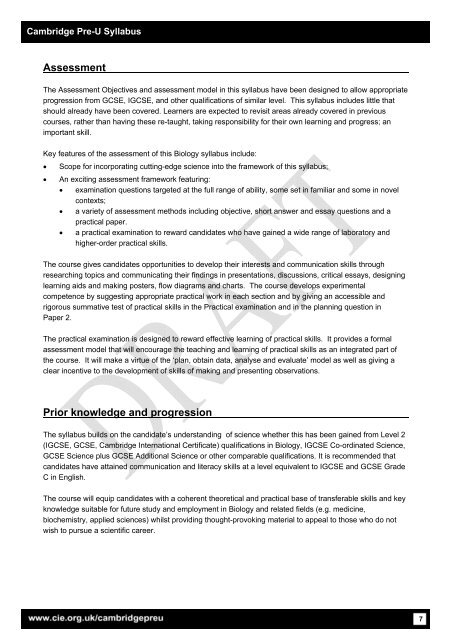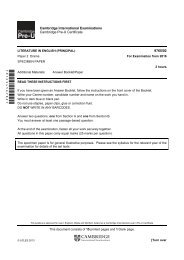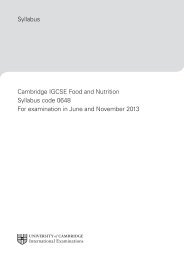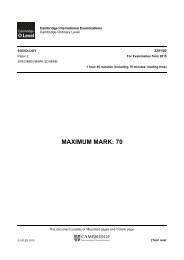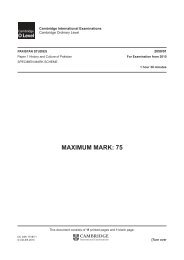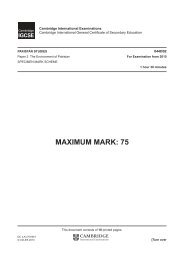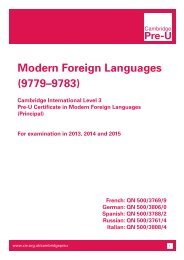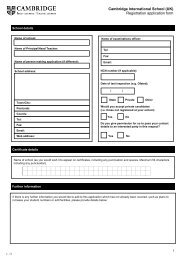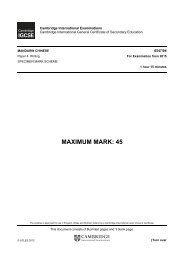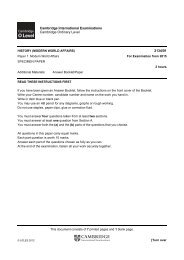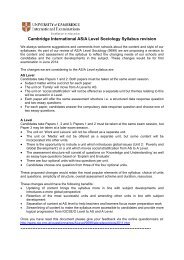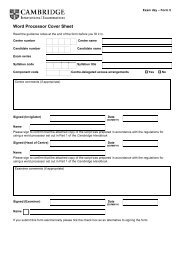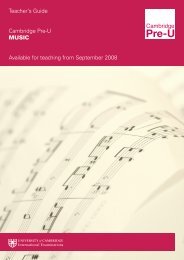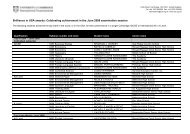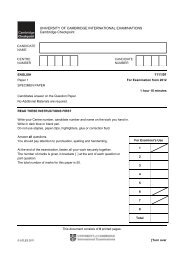Cambridge Pre-U Syllabus - Cambridge International Examinations
Cambridge Pre-U Syllabus - Cambridge International Examinations
Cambridge Pre-U Syllabus - Cambridge International Examinations
Create successful ePaper yourself
Turn your PDF publications into a flip-book with our unique Google optimized e-Paper software.
<strong>Cambridge</strong> <strong>Pre</strong>-U <strong>Syllabus</strong><br />
Assessment<br />
The Assessment Objectives and assessment model in this syllabus have been designed to allow appropriate<br />
progression from GCSE, IGCSE, and other qualifications of similar level. This syllabus includes little that<br />
should already have been covered. Learners are expected to revisit areas already covered in previous<br />
courses, rather than having these re-taught, taking responsibility for their own learning and progress; an<br />
important skill.<br />
Key features of the assessment of this Biology syllabus include:<br />
• Scope for incorporating cutting-edge science into the framework of this syllabus;<br />
• An exciting assessment framework featuring:<br />
• examination questions targeted at the full range of ability, some set in familiar and some in novel<br />
contexts;<br />
• a variety of assessment methods including objective, short answer and essay questions and a<br />
practical paper.<br />
• a practical examination to reward candidates who have gained a wide range of laboratory and<br />
higher-order practical skills.<br />
The course gives candidates opportunities to develop their interests and communication skills through<br />
researching topics and communicating their findings in presentations, discussions, critical essays, designing<br />
learning aids and making posters, flow diagrams and charts. The course develops experimental<br />
competence by suggesting appropriate practical work in each section and by giving an accessible and<br />
rigorous summative test of practical skills in the Practical examination and in the planning question in<br />
Paper 2.<br />
The practical examination is designed to reward effective learning of practical skills. It provides a formal<br />
assessment model that will encourage the teaching and learning of practical skills as an integrated part of<br />
the course. It will make a virtue of the ‘plan, obtain data, analyse and evaluate’ model as well as giving a<br />
clear incentive to the development of skills of making and presenting observations.<br />
Prior knowledge and progression<br />
The syllabus builds on the candidate’s understanding of science whether this has been gained from Level 2<br />
(IGCSE, GCSE, <strong>Cambridge</strong> <strong>International</strong> Certificate) qualifications in Biology, IGCSE Co-ordinated Science,<br />
GCSE Science plus GCSE Additional Science or other comparable qualifications. It is recommended that<br />
candidates have attained communication and literacy skills at a level equivalent to IGCSE and GCSE Grade<br />
C in English.<br />
The course will equip candidates with a coherent theoretical and practical base of transferable skills and key<br />
knowledge suitable for future study and employment in Biology and related fields (e.g. medicine,<br />
biochemistry, applied sciences) whilst providing thought-provoking material to appeal to those who do not<br />
wish to pursue a scientific career.<br />
7


